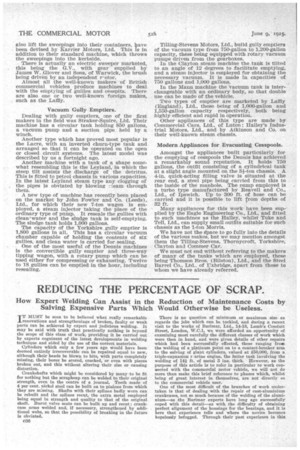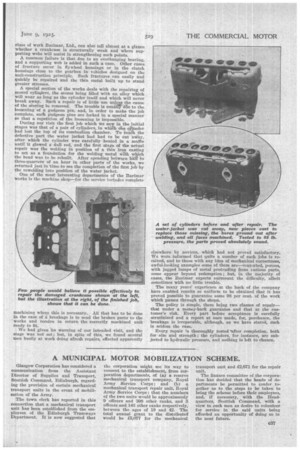REDUCING THE PERCENTAGE OF SCRAP.
Page 20

Page 21

If you've noticed an error in this article please click here to report it so we can fix it.
How Expert Welding Can Assist in the Reduction of Maintenance Costs by Salving Expensive Parts Which Would Otherwise be Useless.
IT MUST be seen to be believed what really remarkable renovations and strengthenings of broken, faulty or weak parts can be achieved by expert and judicious welding. It may be said with truth that practically nothing is beyond the scope of this class of work, providing it be carried out by experts cognizant of the latest developments in welding technique and aided by the use of the correct materials.
Cylinders which only a few years ago would have been deemed entirely irrecoverable can be repaired equal to new, although their heads be blown to bits, with parts completely missing, their bores be scored, cracked, or even with pieces broken out, and this without altering their size or causing distortion.
Crankshafts which might be considered by many•to be fit for nothing but the scrapheap can be welded to their original strength, even in the centre of a journal. Teeth made of 4 per cent. nickel steel can be built on to pinions from which they are m:ssing. Shafts with their splines badly worn can be rebuilt and the splines recut, the extra metal employed being equal in strength and quality to that of the original shaft. Burnt valve seats can be built up and recut ; crankcase arms welded and, if necessary, strengthened by additional webs, so that the possibility of breaking in the future is obviated.
c36
There is no question of minimum or maximum size as regards the jobs which can be tackled, and during a recent visit to the works of Barimar, Ltd., 14-18, Lamb's Conduit Street, London, W.C.L we were afforded an opportunity of examining most carefully the different classes of work which were then in hand, and were given details of other repairs which had been successfully effected, these ranging frorn the welding of a platinum point on to a contact-breaker arm to the salving of giant cylinders, valued at £50,000, from a triple-expansion r-arine engine, the latter task involving the welding of 141 ft. of metal 3 ins. thick. • However, as the purpose of this article is to refer in particular to work connected with the commercial motor vehicle, we will not do more than make this brief reference to phases which, whilst being of great interest in themselves, are not directly so to the commercial vehicle user.
One of the most difficult of the branches of work undertaken is that of dealing with the repair of cast-aluminium crankcases, not so much because of the welding of the aluminium—as the Barimar experts have long ago successfully coped with this detail—as with the difficulty of obtaining perfect alignment of the housings for the bearings, and it is here that experience tells and where the novice becomes hopelessly befogged. Through their past experience in this
class of work Barimar, Ltd:, can also tell almost at a glance whether a crankcase is structurally weak and where supporting webs will assist in strengthening such points. A common failure is that due to an overhanging bearing, and a supporting web is added in such a case. Other cases of fracture occur in flywheel housings or in the clutch housings close to the gearbox in vehicles designed on the unit-construction principle. Such fractures can easily and quickly be repaired and the thin metal built up to stand greater stresses.
A special section of the works deals with the repairing of Scored cylinders, the scores being filled with an alloy which will wear as long as the cylinder itself and which will never break away. Such a repair is of little use unless the cause of the searing be removed. The trouble is usuairf. cliie to the loosening of a gudgeon pin, and, in order to make the job complete, such gudgeon pins are locked in a special manner so that a repetition of the loosening is impossible.
During our visit the first job which we saw in the initial stages was that of a pair of cylinders, in which oe citlinder had lost the top of its combustion chamber. To reach the defective part the water jacket had had to be cut away, after which the cylinder was carefully 'heated in a muffle until it glowed a dull red, and the first stage of the actual repair was the welding in position of a thin iron casting to act as a foundation for the welding metal with Which the head was to be rebuilt. After spending betWe,en hall to three-quarters of an hour in other parts of the works, we returned just in time to see the completion of the first job by the rewelding into position of the water jacket.
One of the most interesting departments of the Barimar works is the machine shop—for the service includes complete machining where this is necessary. All that has to be done in the case of a breakage is to send the broken parts to the works and receive in return the correctly machined unit ready to lit.
We had „given no warning of our intended vieit, and the stage was not set ; but, in spite of this, we found several men busily at work doing afresh repairs, effected apparently elsewhere by novices, which had not proved satisfactory. We were informed that quite a number of such jobs is received, and to those with any idea of mechanical correctness, awful-looking examples some of them are—contorted, porous, with jagged lumps of metal protruding from various parts, some appear beyond redemption; but, in the majority of cases, the Barimar experts surmount the difficulty, albeit sometimes with no little trouble.
The many years' experience at the back of the company have enabled results so uniform to be obtained that it has proved possible to guarantee some 98 per cent, of the work which passes through the shops.
The policy is simple, there being two classes of repair— that under a money-back guarantee and that at the customer's risk. Every part before acceptance is carefully scrutinized and a report at once made, for, perchance, the breakage is irreparable, although, as we have stated, such is seldom the case.
Every repair is thoroughly tested 'after completion, both for size and strength ; the cylinders, for instance, are subjected to lidraulic pressure, and nothing is left to chance.






























